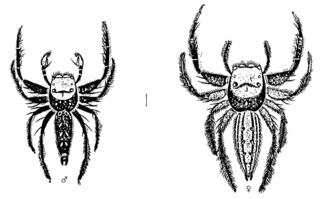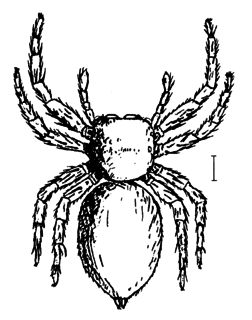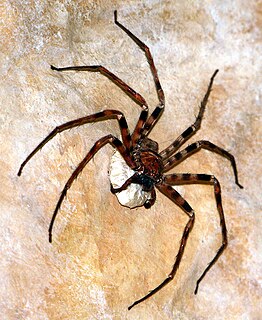
Myrmarachne is a genus of ant-mimicking jumping spiders that was first described by W. S. MacLeay in 1839. They are commonly called antmimicking spiders, but they are not the only spiders that have this attribute. The name is a combination of Ancient Greek μύρμηξ (myrmex), meaning "ant", and ἀράχνη (arachne), meaning "spider".

Agorius is a genus of spiders in the family Salticidae. The genera Agorius and Synagelides are separated as a genus group, sometimes called subfamily Agoriinae but more recently downranked to tribe Agoriini of the Salticoida clade in subfamily Salticinae.
Bathippus is a genus of jumping spiders.

Bavia is a genus of jumping spiders.
Echeclus is a genus of the spider family Salticidae.

Epeus is a genus of the spider family Salticidae. They are often found on broad-leaved plants or shrubs of rain forest, or in gardens of Southeast Asia.
Erasinus is a genus of the spider family Salticidae.
Ergane is a genus of jumping spiders that was first described by Ludwig Carl Christian Koch in 1881. Males of E. benjarei is 9 millimetres (0.35 in) long. The form of the pedipalp and the abdominal pattern suggest that Ergane is close to Chalcotropis. It is named after the goddess Athena, called Athena Ergane as the patron of craftsmen and artisans.

Harmochirus is a genus of the spider family Salticidae.
Ligonipes is a spider genus of the jumping spider family, Salticidae. Five of the six described species are found in the Australian region, the exception being Ligonipes similis, recorded as being from Sumatra. Their body form mimics ants.

Mantius is a spider genus of the jumping spider family, Salticidae.

Margaromma is a spider genus of the jumping spider family, Salticidae. The eight described species occur mostly in Australia and New Zealand, with several other species on Pacific islands. One species is found in Cameroon.
Microhasarius is a spider genus of the jumping spider family, Salticidae.

Piranthus is a genus of jumping spiders first described in 1895 by Tamerlan Thorell, who derived the name from Greek mythology. As of February 2019 this genus contains only two species.
Pristobaeus is a genus of jumping spiders that was first described by Eugène Louis Simon in 1902.

Telamonia is a genus of jumping spiders that was first described by Tamerlan Thorell in 1887. They are colorful spiders, with patterns that vary considerably between sexes and species. Two longitudinal stripes along the abdomen are common, and the carapace is often colored. They have a slender opisthosoma and long legs.
Vailimia is a genus of Asian jumping spiders that was first described by C. F. Kammerer in 2006. It was first described in 1907 from a single male about 6 millimetres (0.24 in) long. It was originally thought to be close to Harmochirus, but the male pedipalp, chelicera, and cephalothorax drawn by Proszynski in 1984, and information gained from later collected specimens indicates otherwise. Subsequently, three more species have been identified. It may be a synonym for Pancorius.

Viciria is a genus of jumping spiders that was first described by Tamerlan Thorell in 1877. The genus includes thirty-one accepted species.

Heteropoda is a genus of spiders in the family Sparassidae, the huntsman spiders. They are mainly distributed in tropical Asia and Australia, while at least one species, H. venatoria, has a cosmopolitan distribution, and H. variegata occurs in the Mediterranean.

Euophryini is a tribe of jumping spiders. It has also been treated as the subfamily Euophryinae.












